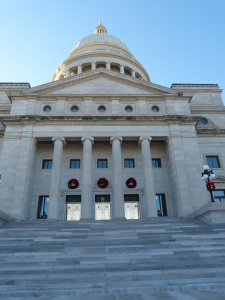 The May primary elections are less than 4 weeks away. Between the primary elections, runoff elections, special elections, and the November General Election, it’s no wonder people routinely express confusion over exactly what each election is and what their vote does.
The May primary elections are less than 4 weeks away. Between the primary elections, runoff elections, special elections, and the November General Election, it’s no wonder people routinely express confusion over exactly what each election is and what their vote does.
As Election Day approaches, we thought it would be a good idea to type up a simple primer of what each election is and what it does. Whether you’re a student who is just learning about elections or an adult who missed some of the finer nuances of self-government in civics class, we hope you will find this brief primer helpful in understanding what is going on this year.
Primary Elections
Elections are held in even-number years (with a few exceptions, which we will mention shortly). In Arkansas, some elected officials serve two-year terms (like members of the Arkansas House of Representatives) while others serve four-year terms (like the Governor and members of the Arkansas Senate).
Candidates file for office during the spring of each election year. Primaries, or “Preferential Primary Elections,” are held in May to allow political parties to select a nominee for elections in the fall. In Arkansas, the only parties who hold primary elections typically are the Democratic and Republican parties.
If elections were a basketball tournament, the May primaries would be the first round. Candidates square off with members of their own parties to determine who gets to advance to the next round of elections. For instance, if three different Republicans each wanted to be Governor, they would first run against each other in a May primary election. The winner of the primary would then go on to run for Governor in November against candidates from other parties.
As a voter participating in a primary election, you only vote for candidates from a particular party. Since the primary election consists of candidates running against members of their own party, you will be given a ballot consisting of candidates from one party; the ballot will also include nonpartisan races, such as judicial candidates.
If you are a Democrat, you can be given a Democratic ballot on Primary Election Day, and you can vote for the Democratic candidates you would like to see run for office in November. There will not be any Republican candidates on your ballot, because you are not participating in the Republican primary.
Runoff Elections
Sometimes in an election with more than two candidates running for the same seat, no candidate will get a majority of the vote. If no candidate in a race gets more than 50% of the vote, the top two candidates from that race go to a runoff a few weeks following the election.
For instance, if three Republicans are vying for the same seat in a primary election, one of them could get 45% of the vote; one could get 40%; and one could get 15%. If that happens, the top two candidates (the one who got 45% of the vote and the one who got 40%) will go head-to-head in a runoff election.
Runoffs typically occur following a primary election. The winner of the runoff election following a May primary advances to the next round: The General Election in November.
General Elections
General Elections are held the first Tuesday of each November in even-number years. General Elections held in the middle of a U.S. President’s term are sometimes referred to as “midterm elections.” The 2014 November General Election, for instance, will be a “midterm election.”
General Elections are the main event of the election year. The General Election is the final vote in which candidates win or lose their races for office.
Whereas in the primary elections, Republicans run against other Republicans or Democrats run against other Democrats, in the General Election Republican candidates, Democratic candidates, Green party candidates, Libertarian candidates, and independent candidates all run against each other. Who ever wins gets to go into office.
A Word About Third-Party Candidates and Independents
Even though the two biggest parties in Arkansas are the Democratic and Republican parties, there are others, including the Libertarian and Green parties; there are also candidates who are independent of any political party.
Independent candidates are required by state law to submit to the Secretary of State a certain number of petition signatures from citizens who want to see the candidate on the ballot; having Arkansans sign a petition to place an independent candidate on the ballot is intended to ensure any candidate for office has at least some consensus of support behind him or her.
Third-party candidates (i.e. candidates who are not Republicans or Democrats) are not usually chosen through a May primary election. Rather, members of the party typically gather for conventions or caucuses in which they select the candidates they want to place on the ballot in November. Put another way, members of the party hold a meeting to determine which candidates they will nominate instead of holding statewide elections in May.
Special Elections
If an elected official passes away, resigns, or is removed from office for some reason, a special election may be called to fill that official’s vacant office. Special elections can be held in odd-number years.
The local government–such as a county’s quorum court–can also hold special elections to vote on tax increases and other local issues, if necessary.
Ballot Issues and Constitutional Amendments
At the November General Election, voters are often asked to weigh in on legislation and amendments to the Arkansas Constitution.
The Arkansas Legislature can refer up to three measures to voters per election. These measures are often things like changes to state tax laws or amendments the legislature believes need to be made to the Arkansas Constitution.
Additionally, citizens can, through what is called the Initiative and Referendum Process, collect petition signatures to place a law or amendment on the ballot. This was done in 2012, with the medical marijuana measure; 2008, with the Arkansas Adoption and Foster Care Act as well as with the Arkansas Lottery Amendment; and in 2004, with the Arkansas Marriage Amendment.
Local citizens may also collect signatures to place a measure on their local ballot. For instance, citizens may collect signatures to place a measure on the ballot to make their county wet or dry.
Voting on ballot issues allows the voters to act as a lawmaking body, deciding for themselves whether or not something should be law.
Conclusion
The process by which elected officials are chosen by the voters is a long one that is often misunderstood. Voters sometimes confuse the May primary elections with the November General Election, or fail to understand why we have so many elections in the first place. The process, however, allows voters to start with a large pool of candidates for office, narrowing their choices down until only one person is chosen. It’s a valuable process that, ideally, helps citizens choose the very best and most qualified people to govern.


